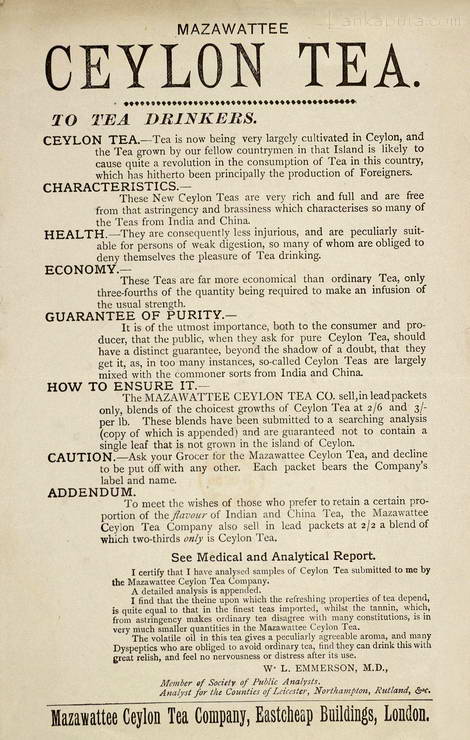BLACK TEA: HEALING POWERS

BLACK TEA: HEALING POWERS
During your Sri Lanka Holidays visit Ceylon Health Triangle of Sri Lanka to enjoy Ceylon Tea, the finest Black Tea in the world and rejuvenate in the highland sanatariums of Sri Lanka Holidays Nuwara Eliya or Ella or Bandarawela or Haputale or Diyatalawe
The healing powers of Black Tea run back to 2737 BC in China. In ancient Indian Ayurveda medical science, Black Tea was identified as a medicament belonging to the class of “Rasayana” promoting good health, raising resistance to diseases & assuring full life span. Rasayana do not belong to the category of medicaments that are put into work following the onset of a disease. Though Black Tea was known to Europeans since 16th century, became popular among the affluent society since the 17th century, became an essential commodity of the life of western world since 19th century, it was not till the 21st century that Europeans began to grasp the medicinal value of the beverage Black Tea made of the Eastern herb Camellia sinensis. Black tea took root in the western lifestyle as an invigorating beverage that would bring in instant cheer & gear up the tired mind & body. Black Tea was also to become the centerpiece of social gatherings.
Recent scientific studies on Black tea have begun to unravel the specific beneficial effects on the human body & mind.
Black tea is rich in antioxidants
Black Tea, Green tea & Oolong tea are excellent sources of Antioxidant called polyphenos: catechins, flavonols, the flavins and the arubigins. Antioxidants are substances that reduce, neutralize, and prevent the damage done to the cells of human body by Free radicals.
Highly reactive Free radicals- atoms, molecules, or ions with unpaired electrons- are borne out of oxidation process of our being. Left to its own killer sway, the Free radicals could injure surrounding cells & cause damage to DNA, resulting in cancer.While human body regulates a complex system of multiple types of antioxidants, low levels of antioxidants results in damaging or killing human cells, the building blocks of the system.
Black tea helps prevent type 2 diabetes
That Black tea (the same green leaf Camellia sinensis is processed into Green tea, Black Tea or Oolong tea by controlling biological oxidation) may help to combat type 2 diabetes, the most common form of the disease is discovered at the laboratory stage by a group of scientists led by Dr. Graham Rena of Neurosciences Institute of the University of Dundee, Scotland in March 2008. The discovery was made on a research to locate compounds with a potential to replace insulin in treatment of patients of diabetes 2. Diabetes 2 is a medical complication in which patient’s body cells become resistant to insulin, an essential regulator of blood sugar.
Dr. Rena found Black Tea antioxidants theaflavins and thearubigins to mimick the insulin action on proteins known as foxos (forkhead transcription factor family O). Now it has been increasingly recognized that obesity, diabetes, insulin resistance & cardiovascular diseases are varied manifestations of a multifaceted medical complication: metabolic syndrome. It seems, at last, the western medical science has stuck a cord with ancient Ayurvedic treatments which boils down to three root causes with respect of all maladies & deceases: vata (wind/spirit/air), pitta (bile) and kapha (phlegm). So called metabolic syndrome is an aspect of Pitta (bile).
Publication: journal Aging Cell. March 2008
Lead scientist: Dr Graham Rena, Caledonian Research Foundation Fellow & Lecturer.
Black tea helps prevent Heart strokes
American Heart Association’s annual International Stroke Conference in San Diego, California was presented with human observational results of 9 studies across 195,000 individuals & 4378 heart strokes. The research was carried out by UCLA (University of California, Los Angeles) & sponsored by The Unilever Lipton Institute of Tea funded this study.
“What we saw was that there was a consistency of effect of appreciable magnitude,” “By drinking three cups of tea a day, the risk of a stroke was reduced by 21 percent. It didn’t matter if it was Green tea or Black tea” said author Lenore Arab. Although a randomized clinical trial is needed to confirm this effect, the findings suggest that drinking three cups of Green tea or Black Tea a day could help prevent an ischemic stroke- blockage of an artery in the brain. It has been speculated antioxidant epigallocatechin gallate (EGCG) or the amino acid theanine is responsible for the effect.
Publication: online edition of Stroke: Journal of the American Heart Association, February 2009.
Lead scientist: Dr. Lenore Arab, a professor of biological chemistry.
Black tea helps reduce the risk on breast cancer
Based on a case-control study across 5000 women aged between 20 & 74 who had been treated for breast cancer & 4500 healthy women, it was claimed reduced risk of cancer in women under 50 who drank three or more cups a day. Younger women who consumed large amounts of Black Tea each day cut their chances of developing any type of breast tumor by about 37%.
Publication: online edition of Stroke: Cancer Epidemiology, Biomarkers and Prevention, a peer-reviewed medical journal January 2009.
Lead scientist: Dr Nagi Kumar of the Cancer Center and Research Institute in Tampa, Florida


